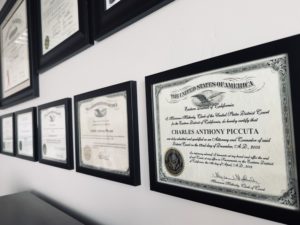What Are the Differences Between California and Arizona Law for Car Accidents?
What Are the Differences Between California and Arizona Law for Car Accidents?
People always call our office wondering about the difference between Arizona and California law. In fact, often times, it is not even people who are injured. We get calls monthly from attorneys licensed in California who want to know about Arizona law. Likewise, we frequently get questions from Arizona attorneys who want to know about California law.
The reason these attorneys are calling our office is because they are usually representing a client and are unfamiliar with the laws that apply to the client’s case. This often happens when an attorney has represented a client in the past, and that client goes back to the same attorney when they are injured again out of state. However, the reality is, the attorney should not be handling the client’s case if he is not familiar with the laws that apply.
Naturally, these attorneys have a conflict of interest. They want to help their former clients and at the same time they want to charge fees for doing so. However, instead of referring the case to an attorney licensed in the state where the injury happened, they decide to keep it and attempt to handle it. This is because they will make money by taking the case. Of course, since the attorneys are not licensed or familiar with the laws of that state, they put their client at a severe disadvantage.
We get calls monthly from attorneys licensed in California who want to know about Arizona law.
This applies even to the best attorneys. A very good personal injury attorney in California, will not be effective in Arizona if he is unfamiliar with the laws that apply. The opposite is also true. A very skilled Arizona car accident attorney, may be unable to competently help with a California case if he does not know the law there.
There Are Limits as to What an Out of State Attorney Can Do
There are also prohibitions that apply to attorneys representing clients in out-of-state matters. These prohibitions are state specific. Each state has rules on what constitutes the practice of law and which activities require a law license. Some states allow an attorney from out of state to negotiate and settle claims with insurance companies even though not licensed there. Other states do not. It could very well be that if you hire a local attorney to handle your out of state claim, he may not even know he is engaging in the unauthorized practice of law.

With that said, there are several differences between Arizona and California laws that apply to a typical car accident case. The below may be helpful to you if you were involved in a car accident in California but live in Arizona. It may also be helpful to you if you were involved in a car accident in Arizona but live in California. It will certainly be helpful to any attorneys who are dabbling in claims in California or Arizona if they do not regularly practice there. Perhaps this page will save us from having to answer the phones calls from these attorneys which we seem to get on a routine basis.
What Is the Difference Between Car Insurance Policy Limits In California and Arizona?
There is a difference between the minimum car insurance required in California and Arizona. California minimum automobile insurance limits are $15,000 per person and $30,000 per accident. Arizona minimum automobile insurance limits are $25,000 per person and $50,000 per accident.
This means that everyone in California must have automobile liability insurance that provides coverage of $15,000 to any single person injured in a car accident. This also means that everyone in California must have $30,000 in coverage per accident to cover more than one injured person.
Assume that a California driver, with minimum car insurance, causes a car accident with a van and injures five passengers in the van. The most that any single injured passenger could recover is $15,000. The most that all five injured passengers could recover combined is $30,000. The $30,000 would need to be divided up between the five injured passengers.
The same would be true in Arizona, except the limits in Arizona are higher. Arizona requires $25,000 in coverage for any single injured person in an accident. Arizona requires a minimum of $50,000 for each accident. When an accident injuries multiple people, those people must then split up the $50,000.
However, California’s minimum car insurance limits are set to increase soon. Governor Newsom passed Senate Bill 1107 earlier this year. It amends section 16056 of the California Vehicle Code to increase the minimum motor vehicle financial responsibility limits to $30,000 per person and $60,000 per accident beginning on January 1, 2025. It further increases the minimum limits to $50,000 per person and $100,000 per accident starting on January 1, 2035.
What is the Difference Between Med Pay Reimbursement Rules in Arizona and California?
Medical Payments coverage, also known as Med Pay, is an optional coverage that pays for medical expenses incurred regardless of fault. It is a policy that you can decide to obtain at the time you purchase car insurance. Most Med Pay policies pay this amount even if you have another source that pays it such as health insurance. Other Med Pay policies are considered excess and only pay once all other sources have been exhausted.
Under California law, if you collect Med Pay benefits, an insurance company can make you pay them back if you recover from an at-fault party who caused your injury related treatment. In Arizona, the insurance company only has the right to repayment of these benefits for amounts paid over $5,000. In other words, in Arizona, you can keep the first $5,000 of Med Pay benefits and the insurance company who paid them is prohibited from seeking to collect those benefits back. The same prohibition does not apply in California.
What is the Difference Between Underinsured Motorist Coverage in Arizona and California?
How underinsured motorist coverage applies in California versus Arizona is very different. Underinsured Motorist coverage is an optional coverage you can buy when you obtain car insurance. It protects you and others you care about from individuals who may not have enough insurance to cover the injuries they cause.
The following individuals are typically covered by most underinsured motorist policies:
- Named or listed drivers on your policy
- Yourself
- Any passengers riding in any vehicle listed on your policy
- Any family members who live in your primary residence
Underinsured motorist coverage applies when the damages caused by a car accident injury exceed the amount of insurance coverage the at-fault party has. For example, assume you are in a car accident that is not your fault. The other driver is ultimately found at fault and his insurance is responsible.
Assume further that you suffered serious injuries such as a broken leg. Your hospital expenses are over $50,000 and your pain and suffering damages are worth $75,000. Under that scenario, you would be entitled to $125,000 assuming that there was enough insurance coverage available.
However, the at-fault driver only has $50,000 in coverage. Clearly, the at-fault driver’s insurance coverage is not enough to pay the $125,000 your injury is worth. This is where underinsured motorist coverage comes into play.
If you have the coverage, you can then collect additional benefits from your own insurance. Since the at-fault driver is “underinsured”, you can collect the remaining amount of damages for your injury from your own insurance up to the limits of your underinsured motorist coverage.

However, Arizona and California treat underinsured motorist coverage very differently. In Arizona, you can collect the full amount of your underinsured motorist coverage in addition to what you recover from the at-fault party. It is called a stacking coverage because it stacks on top of the at fault party’s coverage.
For example, in the above scenario, if you had $75,000 in underinsured motorist coverage, you could add that coverage to the $50,000 in coverage the at-fault party has. You could then collect the full amount of $125,000 that your car accident injury was worth.
However, in California, the underinsured motorist coverage is offset by the at-fault party’s insurance coverage. It is not in addition to the at-fault party’s coverage. Instead, it provides the difference between the at fault party’s coverage and the limits of your underinsured motorist coverage.
For example, in the above scenario, you only had $75,000 in underinsured motorist coverage. Under California law, you would only be entitled to collect an additional $25,000 in underinsured motorist coverage. That is because the at fault party’s $50,000 in available coverage must be subtracted from the $75,000 in underinsured motorist coverage. This would leave only $25,000 in underinsured motorist benefits available. You would then be able to collect $75,000 in total compensation. This would be $50,000 from the at-fault party and $25,000 in underinsured motorist coverage. This is a very different result than the calculation under Arizona law.
Differences Between Arizona and California Law in Claiming Damages When a Driver is Uninsured
There is a major difference between how Arizona and California drivers are treated if injured while driving without car insurance. In California, there is a law that prevents uninsured drivers from recovering money for pain and suffering if they are injured in a car accident while driving uninsured. This is regardless of whether or not they are found at fault. Arizona has no such law or prohibition on recovering pain and suffering damages.
Differences Between Arizona and California Law for Claiming Money Damages in a Personal Injury Case
Arizona and California law is very different in what damages are allowed to be recovered in a car accident or personal injury case. The biggest difference is with respect to claiming medical expenses. Medical expenses can be a large component of damages in a serious injury case.
The typical items that can be recovered in a serious personal injury case include the following:
- Past medical expenses
- Future medical expenses
- Past pain and suffering
- Future pain and suffering
- Past lost wages or earnings
- Future lost wages or earnings
If someone had extensive past medical treatment or requires future medical care, the amounts you can recover for these items are very different under Arizona versus California law.
Under California law, you can only recover the amount of medical expenses actually paid or owed. In Arizona, you can claim the full amount of the medical charges billed, regardless of how much was paid. This means that you could potentially recover much more money for medical expenses under Arizona law than under California law.
For example, assume you were in a car accident and received $100,000 in medical treatment for your injuries. Assume further, that your health insurance paid all your medical expenses off and that the providers accepted $20,000 as payment in full. The rest of the billed charges received insurance adjustments and were not owed. In California, you would only be allowed to claim and recover $20,000 in medical expenses. In Arizona, you would be allowed to claim and recover the full $100,000 that was charged, even though this was not actually paid.
The above scenario happens all the time. Health insurance companies often receive steeply discounted rates from health providers who agree to accept that insurance. These amounts are pre-negotiated and the insurance companies pay much less to medical providers than what the billed charges are. The same is true for public health insurance such as Medicaid and Medicare.
Arizona Allows for Balance Billing and California Does Not
Another major difference between California and Arizona in car accidents claims is the ability of hospitals to balance bill. Balance billing is a practice where a hospital can claim the difference between what health insurance paid for a service and what was charged for that service. The hospital is allowed to claim this amount from the at-fault parties when they cause the injury that resulted in the medical treatment. However, in reality, this amount is ultimately paid by the at fault insurance company out of the injured party’s settlement.
Balance billing applies in certain situations depending on the type of health insurance and the circumstances of the treatment. It is allowed in Arizona. However, it generally is not allowed under California law.
Does the Law of the State Where the Car Accident Happened or Where You Live Apply to Your Car Accident Claim
To further complicate the issues above, whether or not the laws of California or Arizona would apply may depend on where the insurance policy was entered into, not where the crash occurred. In other words, the law of the State where you reside and where the insurance company believed you would be mostly driving when they evaluated your driving risk. Your insurance policy will need to be analyzed to determine this. As such, it is recommended, that if you find yourself in this situation, you consult with an experienced injury attorney who has handled claims in more than one state.
We frequently get questions from Arizona attorneys who want to know about California law.
An Attorney Licensed in Both California and Arizona
If you are looking for an attorney licensed in both Arizona and California, contact Scottsdale Injury Lawyers today. The founder of Scottsdale Injury Lawyers, LLC is Charles Tony Piccuta. He is licensed in both Arizona and California.
He obtained his California law license in 2008. He earned his Arizona law license in 2010. Not only is he licensed in both states, but he actively practices personal injury law in both states. He has obtained personal injury verdicts in both states. He currently has several cases pending in both Arizona and California courts.

While other attorneys may be licensed in both states, very few practice in both states regularly. This is not the case with attorney Piccuta. Contact him today if you have a case that requires knowledge of the laws of both states.
Contact Scottsdale Injury Lawyers Today to Handle Your California or Arizona Personal Injury Case
If you were injured in California but live in Arizona, call us today. Likewise, if you were injured in Arizona but live in California, we are available now to discuss your case. We have an experienced attorney licensed in both states. He regularly deals with the laws of both states and can help you with your case or claim. A consultation is free. No fees are charged unless we win your case or obtain a recovery for you. Contact our office today.
About the author: The content on this page was provided by Scottsdale personal injury attorney and civil rights lawyer Tony Piccuta. Piccuta graduated with honors from Indiana University-Maurer School of Law in Bloomington, Indiana (Previously Ranked Top 35 US News & World Report). Piccuta took and passed the State bars of Arizona, California, Illinois and Nevada (all on the first try). He actively practices throughout Arizona and California. He is a trial attorney that regularly handles serious personal injury cases and civil rights lawsuits. He has obtained six and seven figure verdicts in both state and federal court. He has been recognized by Super Lawyers for six years straight. He is a member of the Arizona Association of Justice, Maricopa County Bar Association, Scottsdale Bar Association, American Association for Justice, National Police Accountability Project and Consumer Attorneys of California, among other organizations.
Disclaimer: The information on this web site is for informational purposes only and does not constitute legal advice. The information on this page is attorney advertising. Reading and relying upon the content on this page does not create an attorney-client relationship. If you are seeking legal advice, you should contact our law firm for a free consultation and to discuss your specific case and issues.

